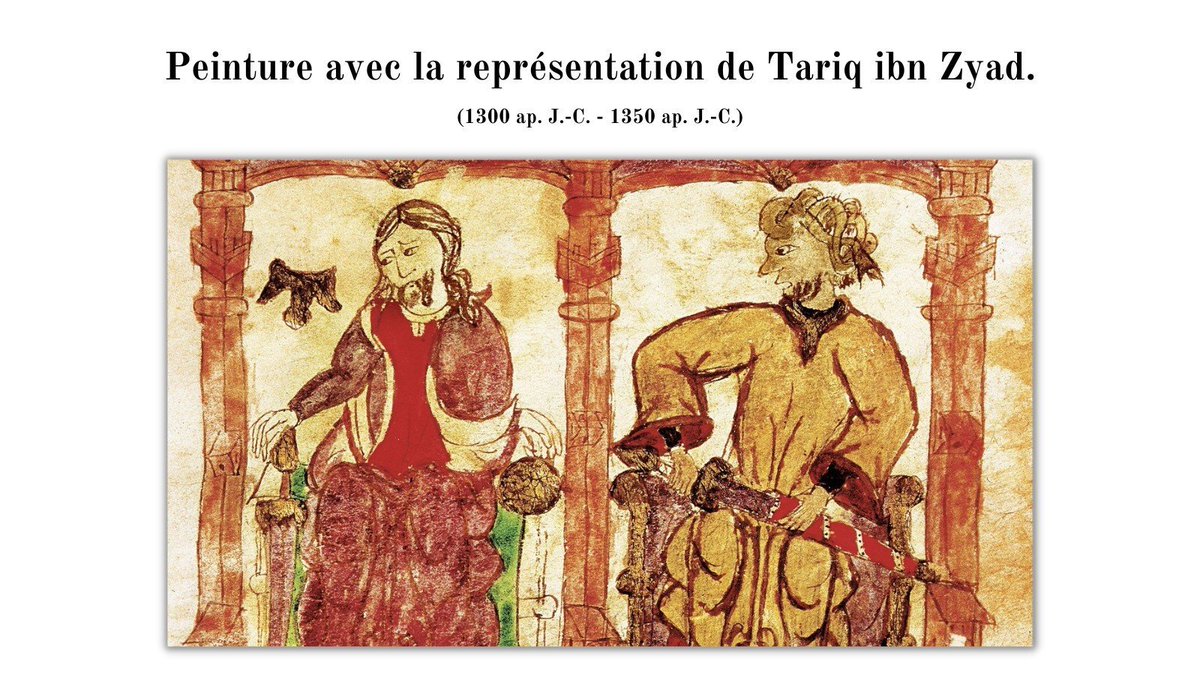In truth, Ramzi Rouighi made much more serious errors in his book. The errors you state are nothing compared to those we noted @lameensouag.
Yet no one seems to have stated them yet, so we will.
(Unroll 🧵)

Yet no one seems to have stated them yet, so we will.
(Unroll 🧵)
https://twitter.com/lameensouag/status/1359814182321991684

When he says that the name "Amazigh" was invented/reinterpreted during the 1950s, that is false.
Without going back to the distortions of the name "Amazigh", the name "Amazigh", as it is, with the same meaning, is attested from the 15th century by Leo Africanus.
Without going back to the distortions of the name "Amazigh", the name "Amazigh", as it is, with the same meaning, is attested from the 15th century by Leo Africanus.

The Berbers, among themselves, used the term “Amazigh” instead of “Berber” to designate things specific to their people (like their name).
Reference: Description de l'Afrique : tierce partie du monde. Volume 1. escrite par Jean Léon l'Africain




Reference: Description de l'Afrique : tierce partie du monde. Volume 1. escrite par Jean Léon l'Africain


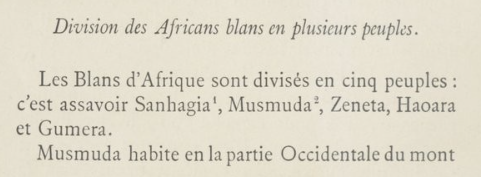

In these passages, Leo the African evokes not only the name "Amazigh" used by the Berbers but also the unity of the different Berber groups (Zenata, Sanhadja, Masmuda etc.) by this name.
These groups, distributed throughout the Maghreb, formed the entire Berber population.
These groups, distributed throughout the Maghreb, formed the entire Berber population.

In a work written by Charles Vallancey, in the 18th century, well before the colonization of the Maghreb, we can read that "The Berbers refer to themselves by the name Amazigh."
This point is attested by several passages.
Reference: Collectanea de Rebus Hibernicis, Vol. IV




This point is attested by several passages.
Reference: Collectanea de Rebus Hibernicis, Vol. IV
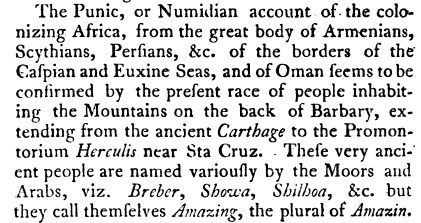
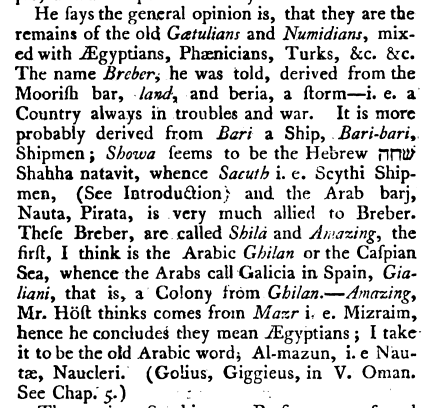
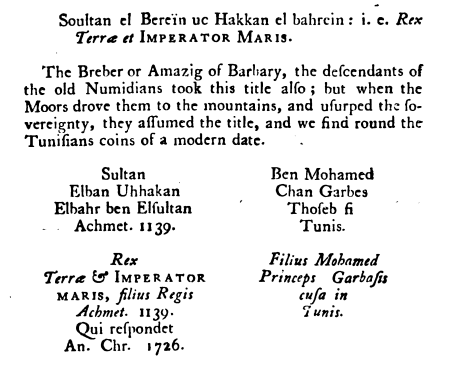
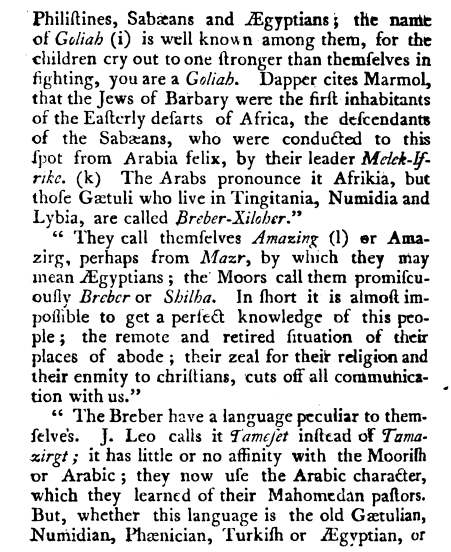
Western sources, at the beginning of colonization, did not “invent” or “divert” the meaning of the name “Amazigh”, they simply rewrote what was said long before them.
On the other hand, they exploited the Berbers to bring them closer to Europeans. Ramzi Rouighi mixes the two.
On the other hand, they exploited the Berbers to bring them closer to Europeans. Ramzi Rouighi mixes the two.

In 1835, when the colonization of Algeria had just begun, it was known that Berbers throughout the Maghreb called themselves Amazighs.
We have provided enough evidence regarding the meaning and precolonial origin of the name.
Reference: Cochrane's Foreign Quarterly Review, n°1
We have provided enough evidence regarding the meaning and precolonial origin of the name.
Reference: Cochrane's Foreign Quarterly Review, n°1
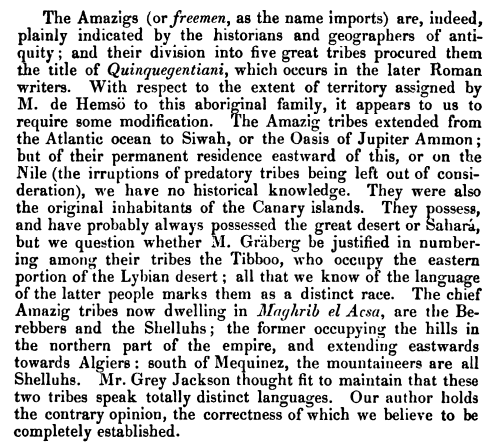
Ramzi Rouighi asserted that "Never, before the Arabs, was North-West Africa a geographical entity and its peoples were never a culturally unified entity, it was only with the Arabs and the term “Berber” and “Maghreb” that it happened”.
Again, wrong.
Again, wrong.

Already we do not define the existence of a people or a region by its political unity, it is ridiculous to insinuate that for a historian.
Then, in history, the name “Berber” was preceded by the name “Libyan”, during pre-Islamic times, with exactly the same meaning it had.
Then, in history, the name “Berber” was preceded by the name “Libyan”, during pre-Islamic times, with exactly the same meaning it had.
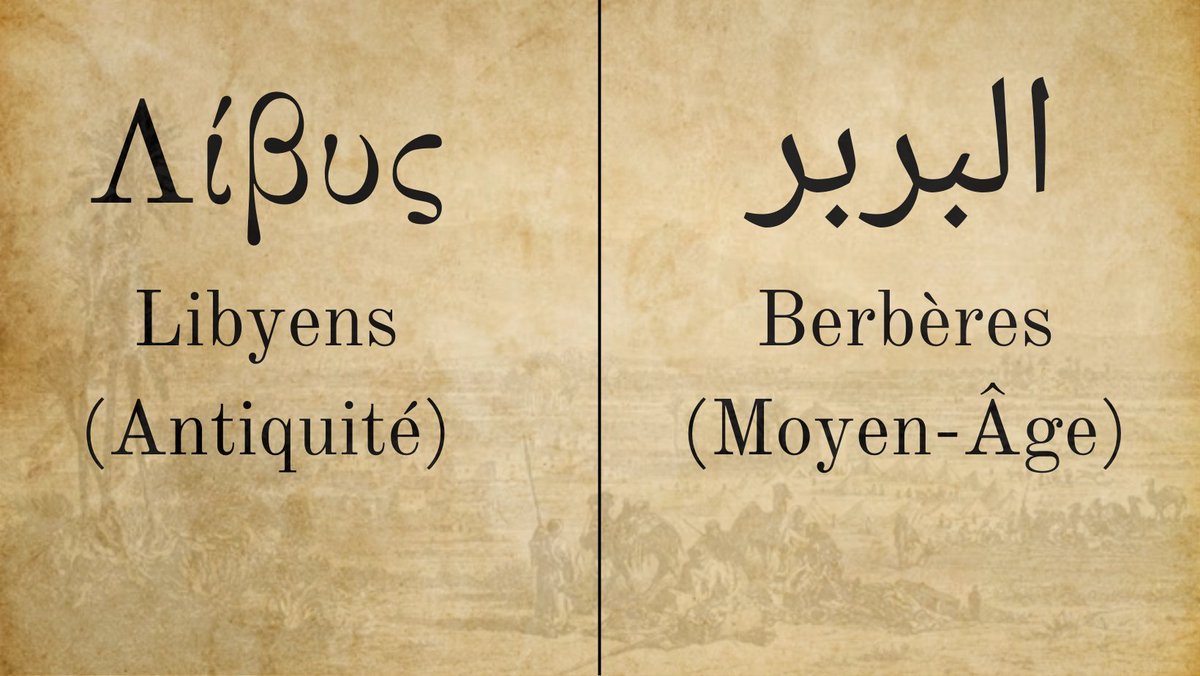
Libyan had the same definition as Berber today, it designated multitudes of groups "Maurusi, Masaessyli, etc" under a common name: Libyan.
Strabo affirmed that the Libyans were culturally unified, they had the same habits, etc.
Reference: Strabon, Géographie, Livre 17, Chap. 3
Strabo affirmed that the Libyans were culturally unified, they had the same habits, etc.
Reference: Strabon, Géographie, Livre 17, Chap. 3
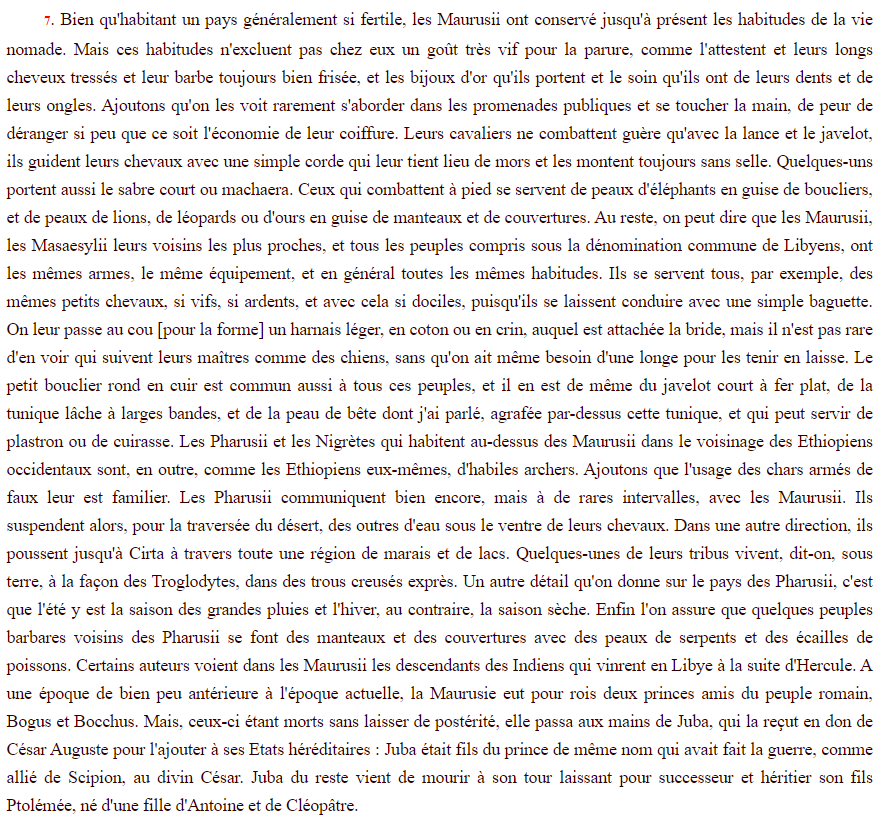
Just like “Berber”, “Libyan” took on the “origin” meaning for ancient authors.
For example, often the Maurusii or Gaetulians were described as being of "Libyan origin" but not the Phoenicians/Carthaginians.
Reference: Strabon, Géographie, Livre 17, Chap. 3
For example, often the Maurusii or Gaetulians were described as being of "Libyan origin" but not the Phoenicians/Carthaginians.
Reference: Strabon, Géographie, Livre 17, Chap. 3
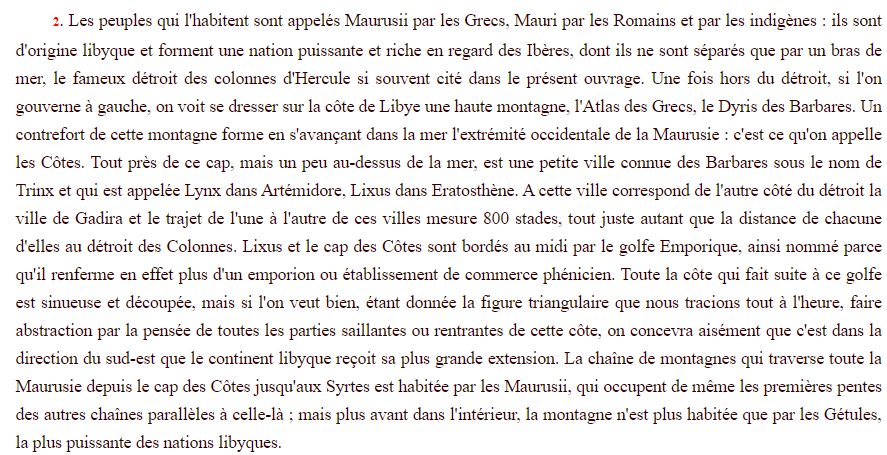
Libyans have indeed defined themselves as such.
Yet “Libyan” was a term that grouped together a multitude of indigenous groups from Northwest Africa.
Reference: Armand Cassel, Lettres inédites de Marc Aurèle et de Fronton
Yet “Libyan” was a term that grouped together a multitude of indigenous groups from Northwest Africa.
Reference: Armand Cassel, Lettres inédites de Marc Aurèle et de Fronton
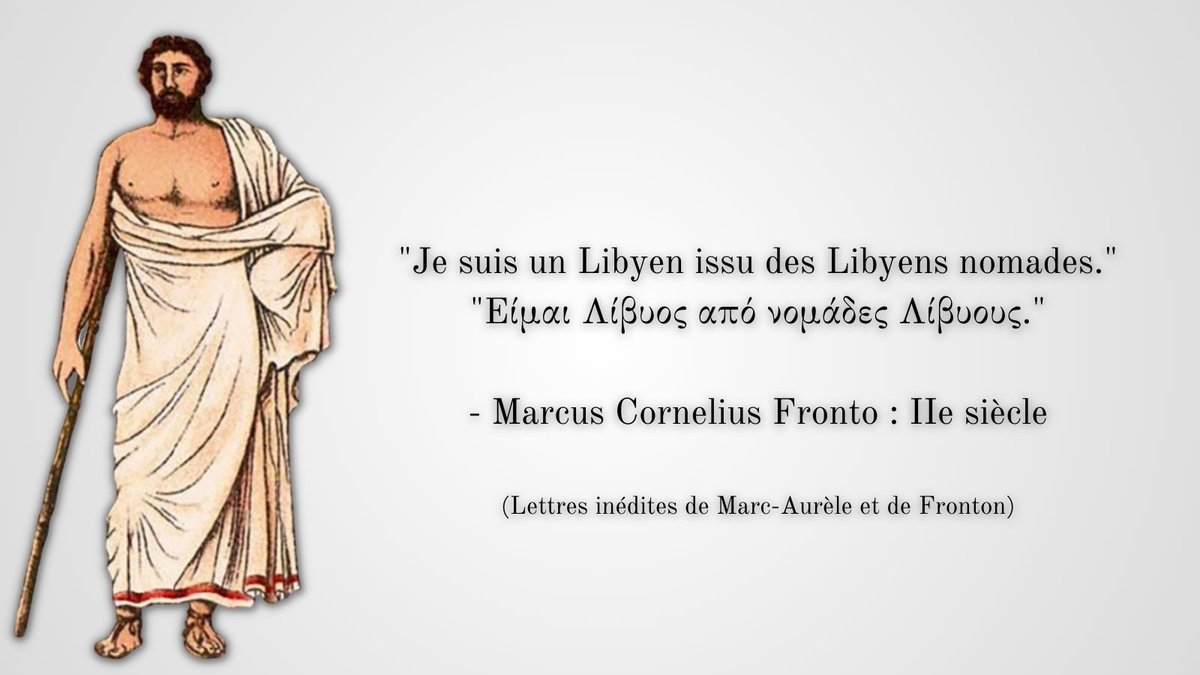
The Tunisian historian Samir Aounallah also goes in this direction by affirming that "Libyan" is almost a synonym for "Berber" or "Amazigh".
And we will see why this opinion is academically valid.
Reference: Samir Aounallah, L'Antiquité Tunisienne
And we will see why this opinion is academically valid.
Reference: Samir Aounallah, L'Antiquité Tunisienne
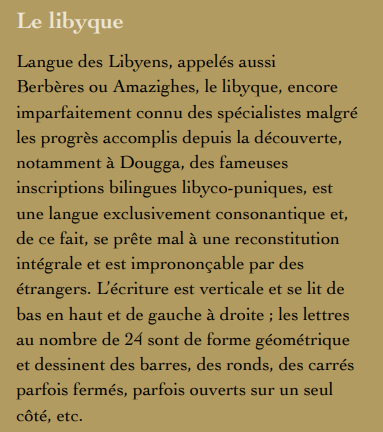
Samir Aounallah affirms that the “Libya” of Antiquity was almost equivalent to the modern Maghreb.
However, our friend Ramzi Rouighi affirms that "Never before the Arabs had North-West Africa been a geographical entity".
However, our friend Ramzi Rouighi affirms that "Never before the Arabs had North-West Africa been a geographical entity".

At this point, you will understand how far Ramzi Rouighi went in omitting and distorting facts in his book but also in his articles.
He has a specific goal: “Erasing the Berbers”, that’s what his book should have been called.
He has a specific goal: “Erasing the Berbers”, that’s what his book should have been called.

Ramzi Rouighi criticizes the fact that we make the kinship link between the Ancient Libyans and the current Berbers but yet this kinship link is proven not only genetically but also historically. 
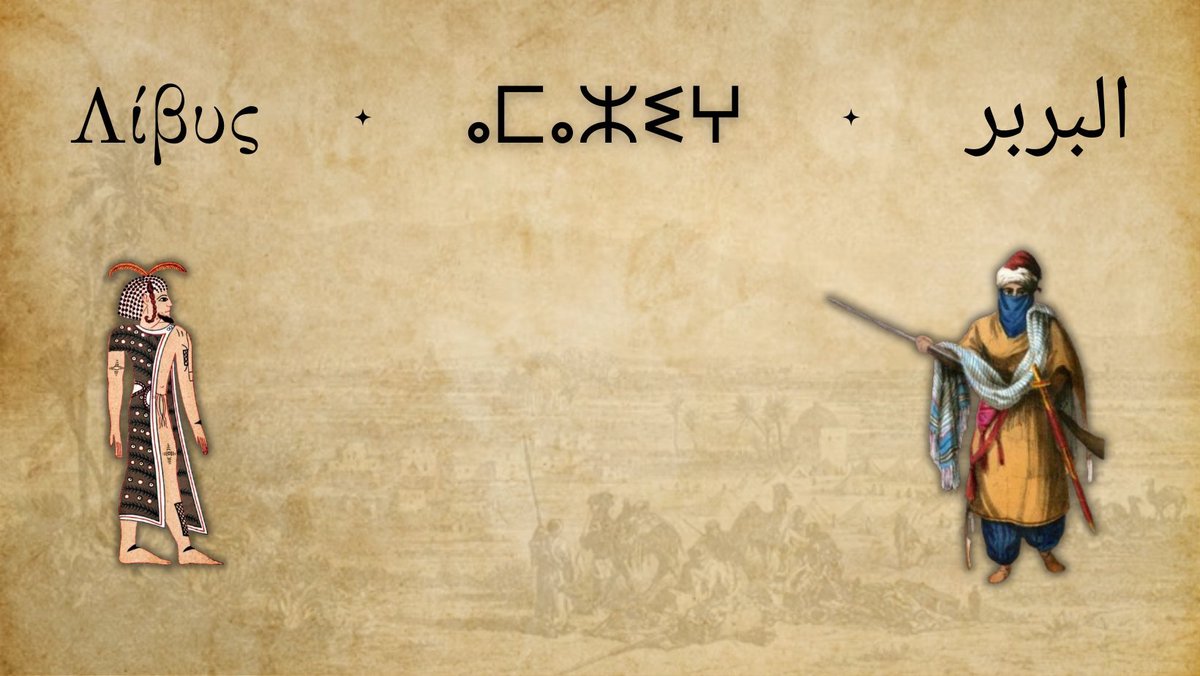
For example, the Jazula, a Berber group reported from the Middle Ages, claimed to be descendants of the ancient Gaetulians, the Gaetulians were considered to be of Libyan origin.
Fact reported in the 16th century.
Reference: L'Afrique de Marmol, Volume 2, d'Ablancourt
Fact reported in the 16th century.
Reference: L'Afrique de Marmol, Volume 2, d'Ablancourt
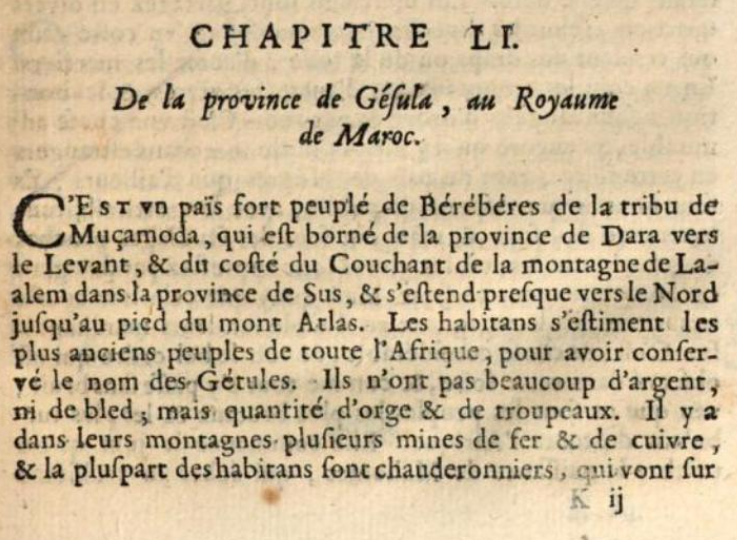
Long before colonization, as we saw above, the Berbers or Amazighs were seen as the descendants of the ancient Libyan peoples (Numidians, etc.).
This connection was obvious to the authors of the time, even pre-colonial ones.
Reference: Collectanea de Rebus Hibernicis, Vol. IV
This connection was obvious to the authors of the time, even pre-colonial ones.
Reference: Collectanea de Rebus Hibernicis, Vol. IV
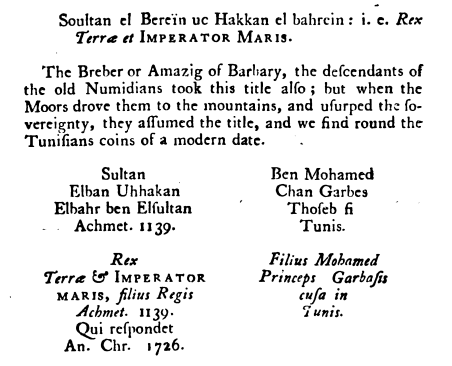
In fact, the Berbers of the Middle Ages still had a vague memory of the names "Libyans" or "Libya" as designating their country or their people.
Reference: Description de l'Afrique septentrionale / par El-Bekri ; traduite par Mac Guckin de Slane
Reference: Description de l'Afrique septentrionale / par El-Bekri ; traduite par Mac Guckin de Slane
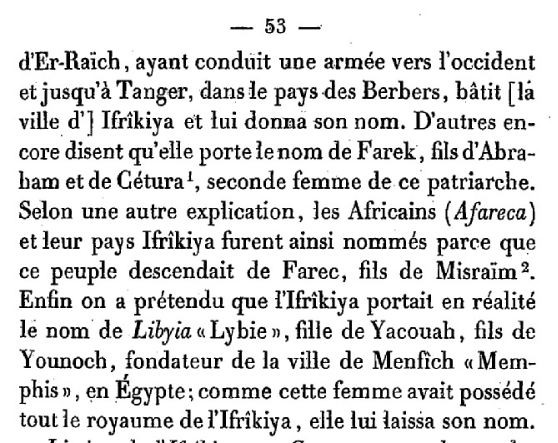
Regarding the fact that the term "Berber" would originally come from the Horn of Africa, this is his opinion.
We know that certain Amazigh groups began to be called by this term at the end of Antiquity.
Reference: Procope, Histoire de la guerre contre les Vandales, Livre IV
We know that certain Amazigh groups began to be called by this term at the end of Antiquity.
Reference: Procope, Histoire de la guerre contre les Vandales, Livre IV

Epigraphs show that the Berbers had used this term to designate themselves as well, abandoning the old term "Libyan".
Reference: موسوعة الثقافة التقليدية في المملكة السعودية المجلد الأول
Reference: موسوعة الثقافة التقليدية في المملكة السعودية المجلد الأول

Indeed, the greatest weakness of the Berber people is that they have not preserved writings or opinions concerning their vision of themselves. So Pan-Arabist ideologists such as Ramzi Rouighi benefit from it.
What we can be sure of, however, is that the Berbers have been called Amazighs since well before the colonial era and that they are indeed descended from the Ancient Libyans.
Don't make the mistake of believing that Pan-Arabism is a harmless ideology.
Not even 15 years ago, people were killed in the Maghreb for teaching their Berber history or for speaking their language.
Reference: books.openedition.org/cjb/1367?lang=…

Not even 15 years ago, people were killed in the Maghreb for teaching their Berber history or for speaking their language.
Reference: books.openedition.org/cjb/1367?lang=…
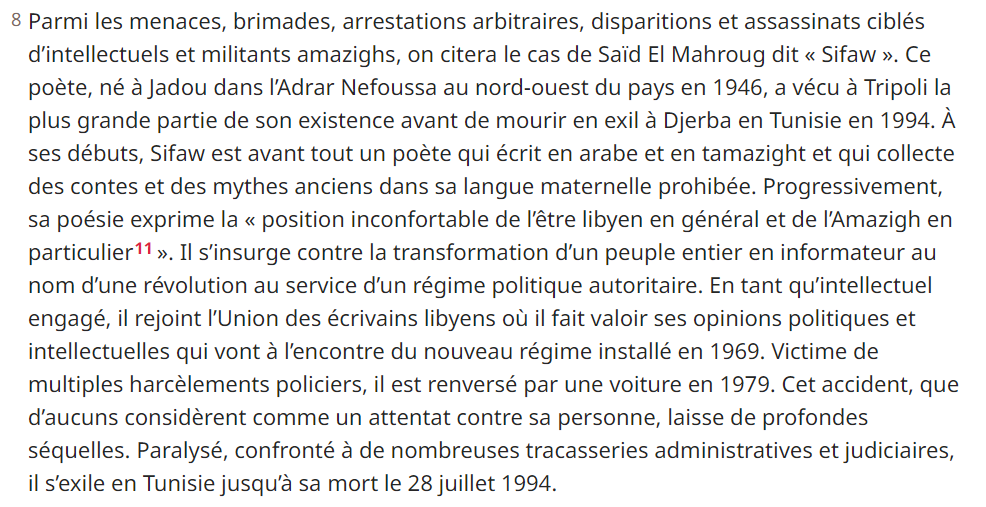
Some Arab authors invented hadiths against the Berbers in order to legitimize their enslavement.
Reference: journals.openedition.org/anneemaghreb/1…
Reference: journals.openedition.org/anneemaghreb/1…
Ramzi Rouighi is only perpetuating a long, hateful tradition that is too widespread in the Maghreb: the destruction of the Berbers.
And for this he uses the instruments at his disposal, he cannot kill the Berbers physically so he tries to kill them on a historical level.
And for this he uses the instruments at his disposal, he cannot kill the Berbers physically so he tries to kill them on a historical level.
And the fact that Berbers consider Arabs as foreigners is not new. The Riffians who fought the Spanish (thus colonialism) also considered the Arabs as foreigners in the same way as the Europeans.
https://x.com/NorthAfricanL/status/1816229337055531385
However, genetics and history conclude that North Africans, both Berber and Arabic speakers, are linked by common Berber origins.
This fact terrorizes the Pan-Arabists because they see themselves as "pure Arabs" and see the Maghreb divided between "Arabs" and "Berbers".
This fact terrorizes the Pan-Arabists because they see themselves as "pure Arabs" and see the Maghreb divided between "Arabs" and "Berbers".
This is exactly what the colonialists wanted.
The agents of colonialism are people like Rouighi, who divide the Maghreb between Arabs and Berbers by denying the Berber heritage of the Maghreb and the Maghrebis and provoking the Berbers with their lies and ridiculous supremacism.
The agents of colonialism are people like Rouighi, who divide the Maghreb between Arabs and Berbers by denying the Berber heritage of the Maghreb and the Maghrebis and provoking the Berbers with their lies and ridiculous supremacism.
PS: We haven't read Rouighi's entire book because these simple errors noted are already too many. There are certainly many other errors there.
Most of the things we know about Berbers/Imazighens/Amazighs, we know from people who were not themselves Berbers and who either said their opinion or reported certain things from the Berbers themselves.
https://x.com/NorthAfricanL/status/1817992268793659446
An anti-Berber propagandist said "The word Amazigh and its meaning were invented in the 1950s for neocolonialist purposes." and everyone believed him for 5 years.
No one realized the lie and the ideological goal of dragging the Berbers through the mud behind these kinds of false assertions.
This parameter should encourage the greatest caution when talking about the Berbers, especially when the goal is to deconstruct them.
This parameter should encourage the greatest caution when talking about the Berbers, especially when the goal is to deconstruct them.
Unroll @threadreaderapp
• • •
Missing some Tweet in this thread? You can try to
force a refresh

















